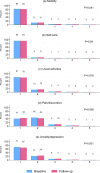COVID-19 and self-reported health of the Norwegian adult general population: A longitudinal study 3 months before and 9 months into the pandemic
- PMID: 39446847
- PMCID: PMC11500952
- DOI: 10.1371/journal.pone.0312201
COVID-19 and self-reported health of the Norwegian adult general population: A longitudinal study 3 months before and 9 months into the pandemic
Abstract
The COVID-19 pandemic had a global impact on daily lives, and this study aimed to assess the effects on broader aspects of health in the general population of Norway. This population-based cohort study assessed changes in health of the Norwegian general population from 3 months before to 9 months during the COVID-19 pandemic. Sampling was based on the results of Norwegian surveys designed for collecting general population norms for health measurement instruments. In December 2019, 12,790 randomly selected adults aged ≥18 years received a postal questionnaire. The 3,200 respondents received a similar follow-up postal questionnaire including the EQ-5D-5L, PROMIS-29 instruments, and questions about respondents having or having had COVID-19. Score changes were compared to estimates for the minimal important change (MIC) and age-related change. Association of instrument change scores with baseline characteristics, health problems, and having had COVID-19 was determined using multivariable linear regression. Of 3101 respondents with unchanged addresses, 2423 (78.1%) responded to the second survey. For all respondents, EQ VAS and PROMIS-29 scores for 6 of 8 domains were slightly poorer (p<0.01) than before COVID-19, and the mean change was below the MIC. In multivariable analyses, the greatest number of poorer outcomes were associated with being female, 18-29 years, or ≥80 years of age (p<0.01); > MIC for ≥ 80 years of age and EQ-5D index, PROMIS-29 physical function and social participation. Respondents who had COVID-19 had poorer outcomes for PROMIS-29 social participation (> MIC). Those reporting COVID-19 in their partner/family and not themselves, had poorer outcomes for PROMIS-29 anxiety and social participation. About 9 months into the COVID-19 pandemic, EQ-5D-5L and PROMIS-29 domain scores showed slightly poorer health in the Norwegian adult general population compared to 1 year earlier in the same respondents. The overall changes were less than expected for age-related change. Relatively poor outcomes defined as important, included general health and social participation for the elderly, and the latter for those having had COVID-19. In conclusion, this study found no evidence for a decline in important aspects of adult general population health in Norway that might be attributed to the pandemic at approximately 9 months.
Copyright: © 2024 Garratt, Stavem. This is an open access article distributed under the terms of the Creative Commons Attribution License, which permits unrestricted use, distribution, and reproduction in any medium, provided the original author and source are credited.
Conflict of interest statement
The authors have declared that no competing interests exist.
Figures
Similar articles
-
Norwegian population norms for the EQ-5D-5L: results from a general population survey.Qual Life Res. 2022 Feb;31(2):517-526. doi: 10.1007/s11136-021-02938-7. Epub 2021 Jul 16. Qual Life Res. 2022. PMID: 34272631 Free PMC article.
-
EQ-5D-5L value set for Norway: a hybrid model using cTTO and DCE data.Qual Life Res. 2025 Feb;34(2):417-427. doi: 10.1007/s11136-024-03837-3. Epub 2024 Nov 20. Qual Life Res. 2025. PMID: 39565555 Free PMC article.
-
Did the Physical and Mental Health of Orthopaedic Patients Change After the Onset of the COVID-19 Pandemic?Clin Orthop Relat Res. 2023 May 1;481(5):935-944. doi: 10.1097/CORR.0000000000002555. Epub 2023 Jan 25. Clin Orthop Relat Res. 2023. PMID: 36696142 Free PMC article.
-
General population norms for the EQ-5D-3 L in Norway: comparison of postal and web surveys.Health Qual Life Outcomes. 2018 Oct 19;16(1):204. doi: 10.1186/s12955-018-1029-1. Health Qual Life Outcomes. 2018. PMID: 30340499 Free PMC article.
-
Evidence on the relationship between PROMIS-29 and EQ-5D: a literature review.Qual Life Res. 2022 Jan;31(1):79-89. doi: 10.1007/s11136-021-02911-4. Epub 2021 Jun 28. Qual Life Res. 2022. PMID: 34181154 Review.
References
-
- Lok V, Sjöqvist H, Sidorchuk A, Flodin P, Osika W, Daly M, et al.. Changes in anxiety and depression during the COVID-19 pandemic in the European population: A meta-analysis of changes and associations with restriction policies. Eur Psychiatry. 2023;66(1):e87. Published 2023 Oct 26. doi: 10.1192/j.eurpsy.2023.2467 - DOI - PMC - PubMed
-
- Nshimirimana DA, Kokonya D, Gitaka J, Wesonga B, Mativo JN, Rukanikigitero JMV. Impact of COVID-19 on health-related quality of life in the general population: A systematic review and meta-analysis. PLOS Glob Public Health. 2023. Oct 26;3(10):e0002137. doi: 10.1371/journal.pgph.0002137 . - DOI - PMC - PubMed
-
- Thygesen LC, Møller SP, Ersbøll AK, Santini ZI, Nielsen MBD, Grønbæk MK, et al.. Decreasing mental well-being during the COVID-19 pandemic: A longitudinal study among Danes before and during the pandemic. J Psychiatr Res. 2021. Dec;144:151–157. doi: 10.1016/j.jpsychires.2021.09.035 Epub 2021 Sep 23. - DOI - PMC - PubMed
MeSH terms
LinkOut - more resources
Full Text Sources
Medical


